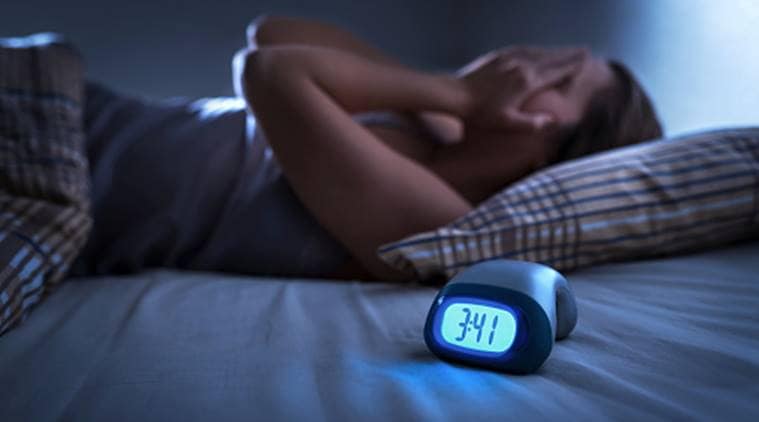A less common sleep disorder is that of waking up early or what is known as an advanced phase of sleep disorder.

There may be quite a few of you who have trouble sleeping at night. Even if you do manage to doze off, you might keep waking up from time to time. Many of us, however, tend to ignore the signs until the problem becomes persistent and result in sleep disorder.
“Sleep disorder is a common problem today that co-exists with headache and day-to-day stress. Some patients do not come forth with sleep issues, but every time they come with a headache problem, a common neurological disorder, we find that at least 60-70 per cent of the times it is related to disrupted sleep. In such cases, the headache may be the culprit for lack of sleep or vice versa,” Dr Rima Chaudhari consultant neurologist, Fortis Hospital Mulund told indianexpress.com.
So what are the signs to watch out for? Dr Chaudhari said that most patients either have trouble falling asleep or find it difficult to maintain sleep throughout the night. “A less common sleep disorder is that of waking up early or what is known as an advanced phase of sleep disorder,” she said.
Types of sleep disorders
Insomnia is not just the only kind of sleep disorder, contrary to popular misconception. Here are the common kinds of sleep disorders you should know about:
Sleep apnea
This is a serious sleep disorder in which the breathing repeatedly stops and starts. This makes the oxygen levels in the blood drop, which the body senses and pulls one out of sleep to help them breathe again. Loud snoring, gasping for air during sleep or waking up with a dry mouth are common symptoms.

Sleep paralysis
This refers to a temporary inability to move or speak during any transition between waking up and falling asleep. People also tend to hallucinate in case of sleep paralysis. Studies show about 7.6 per cent of people experience at least one episode of sleep paralysis in their lives. The episodes typically last for only a couple of minutes as the brain wakes up or falls asleep fully.
Read| Have trouble sleeping? These five foods will help you catch some shuteye
Restless leg syndrome
This is a neurological movement disorder which involves an uncontrollable urge to move your legs due to an uncomfortable sensation like ache, burning or tingling. This condition can cause difficulty in sleeping or disrupt it.
Insomnia
A very common form of sleep disorder, insomnia basically refers to people’s inability to sleep or stay asleep for as long as they desire. People who have insomnia tend to feel sleep during the daytime and can be low on energy, irritable or depressed.
Circadian rhythm disorder
This typically happens when your internal biological clock is not in sync with external time cues. It could be because of working night shifts, jet lag, or having an erratic sleep cycle.

How to sleep better at night
A good night’s sleep, Dr Chaudhari said, is extremely important to regulate our body functions. “There are a lot of hormones including stress-controlling hormones which are maintained while we are asleep. Anyone who says they sleep for only three hours and believe it’s enough is mistaken since that is not very healthy. Lack of sleep interrupts your ability to deal with stress,” she informed.
While stress itself is an important deterrent, our lifestyle choices also impact our sleep cycle. And to cope with sleep issues, here are some tips, suggested by Dr Chaudhari.
1. Maintain a good sleep hygiene
Most of the sleep-related problems can be sorted out with just a good sleep hygiene. This entails maintaining a fixed bedtime, having dinner early and not going to bed too late.
2. Reduce caffeine intake
Nothing refreshes you better than a hot cup of coffee but remember caffeine can impact your sleep quality negatively. It increases adrenaline production and impacts the sleep-inducing functions of the brain.
3. Reduce screen time
From kids to adults, most of us spend a lot of time of the day glued to our mobile phones or laptop screens and sometimes till late at night, delaying sleep. In a 2018 study published in Cell Reports, researchers at Salk Institute showed how certain cells in the eye process ambient light and reset our internal clocks resulting in circadian rhythm disorders.

4. Maintain a proper meal time
There should be a good two-hour gap between the meal and bedtime for better digestion. You should not go to bed immediately after dinner.
5. Exercise regularly
Exercise does not just tire you out but also helps reset the sleep cycle by raising body temperatures slightly which then drops, triggering sleep.
For all the latest Lifestyle News, download Indian Express App
Source: Read Full Article



